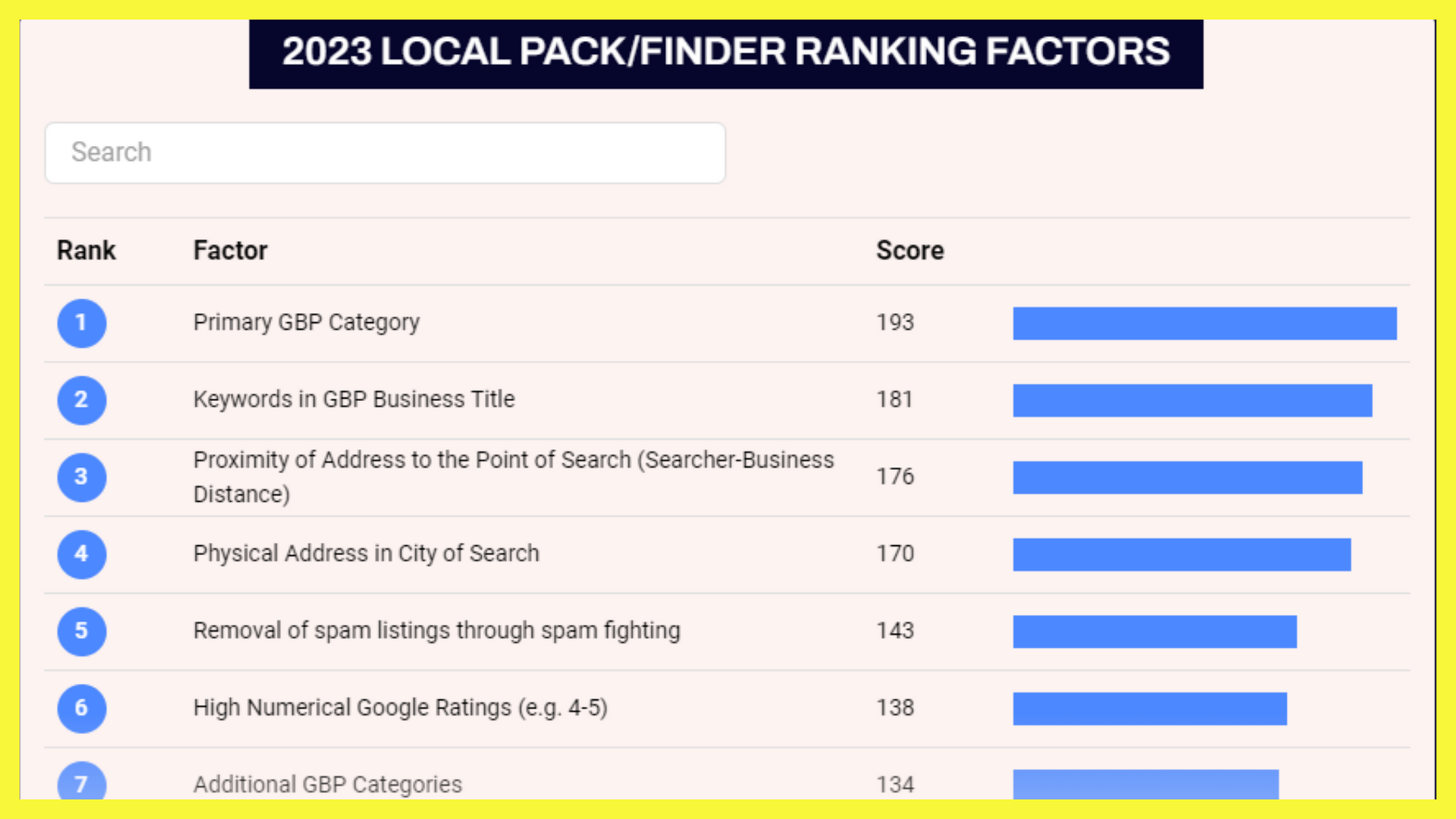Cracking the Code: What Google Really Values in Local SEO Rankings
3 Local SEO Lessons Gleaned from a New Local Search Ranking Factors Study
Whitespark’s 2023 ranking factors study which surveys the top experts in local search to understand what Google might use to rank businesses in the local pack/finder/maps and local organic results is out. These experts were asked to estimate the relative importance or weight that Google assigns to various ranking factor groups within the local search algorithm. This estimation is done for both local pack/finder results (those shown in map-based listings) and local organic results (traditional search results for local queries).
There is no shortage of local search engine optimization advice to get your business on google, rank higher on google my business and improve your local ranking on Google. Unfortunately, much of it is often at odds, conflicting and even confusing. For example don’t start thinking that geo-tagging photos might help your rankings. It won't. But on the on the other hand keywords in google reviews from recent research has shown that keywords in reviews don’t seem to have the ranking impact we thought they did. While this is helpful data, our take is that you still want to insert keywords in review responses because:
- They can drive review justifications which are helpful for conversions.
- They can trigger Place Topics which also help with conversions.
- They can help with conversions when prospective customers browse or search through reviews looking to see if you offer a service and what people are saying about it.
- We only have this one test so far that indicates they don’t have much of a ranking impact. We think one test is enough to provide fairly strong evidence, but we always like to see more data. I think more testing is required on this one.
Ranking Factors Local SEO Services Must Focus On

Here are three lessons we learned from the study:
1. Choosing the right primary category will determine your ranking of local results on google
One thing you've got to nail down to boost your presence on Google Maps and Search is choosing the right primary category for your Google Business Profile. Out of all factors, knowing how to choose a category for your Business Profile has the greatest impact on local pack rankings. Now, I get it, these categories tend to change from time to time, and that can leave local business owners scratching their heads. Currently, you can choose up to 10 categories for your business: 1 primary category, and rest as secondary categories.
Lesson: Picking the right primary category for your Google Business Profile listing is the most important local SEO ranking factor, directly influencing the ranking of your business on Google and helping to improve your online visibility and attract more customers.
2. Keywords in your business name is the #2 local SEO ranking factor
You know, some folks might jump to the conclusion that your business name isn't a card you can play in the SEO game, but we beg to differ. Picking the right business name isn't just a surface-level decision; it's a strategic element with profound implications. What often goes unnoticed is the profound influence it can have on your overarching and local SEO marketing plan. Having your main keywords in your business name can make a massive difference in how your business ranks on Google in the local pack results.
We often work with established businesses and they're invested time and effort in building your brand identity, and they're not about to toss it aside for a Google ranking boost. Some folks resort to a quick fix: they sprinkle keywords into their Google Business profile, hoping for some SEO magic. But, this isn't in line with Google's guidelines.
However, there's a workaround that lets you harness the ranking benefits of keywords without drawing Google's wraft. You can file for a DBA, short for "doing business as," with your state. It's essentially a trade name that lets you operate under a different title without the need for a full-blown business name change. Completely legal and A-OK with Google, as long as it is consistent with your online presence and reflects your real business identity.
Lesson: If you have a business that is outranking you and they are adding keywords to their business name, it can be extremely difficult to compete with them due to the amount of weight Google puts on this in their local algorithm that fuels the 3-pack. The fact is keywords in your Google Business Profile name matter… a lot.
3. Being close to the prospect that is searching on Google (especially since the vicinity update)
Let's break it down in simple terms: "Proximity to searcher" refers to how close the searcher is to the place they're looking for. When you search on Google, especially in Google Maps, what you see is businesses listed based on how near they are to your exact location. Yes, physical proximity to the searcher is a Google ranking factor.
Google flat out tells us that proximity is one of the three big factors in determining local search ranking:
“Local results are based primarily on relevance, distance, and prominence. A combination of these factors helps us find the best match for your search.
“Distance considers how far each potential search result is from the location term used in a search. If a user doesn’t specify a location in their search, we’ll calculate distance based on what we do know about their location.”
Close to a third of all Google searches have local intent – that is, the searcher is looking for something nearby or located in a specific area. Often (but now always) when Google determines there is local intent, it will display top local results in a Map Pack at the top of the search results.
Lesson: Make your location is clear to Google to ensure you appear in relevant search results. Ensure citations (local listings) are accurate and that your business appears where people are searching for local products, services, etc. Claim and verify your Google My Business listing. For Service Area Businesses, ensure that your profile has been set up correctly so you aren’t violating Google’s guidelines for representing the business correctly.
* * *
Contact Your Marketing Consultant at Indispensable Marketing
If you’re a established and local service based business that need insight into Google's local search algorithm to improve local search rankings showing up on the first page of search results on Google at Indispensable Marketing we can help. We offer marketing strategy consulting, marketing audits, monthly marketing packages, consultations, exploratory calls or monthly local SEO services. Contact us for more information.




